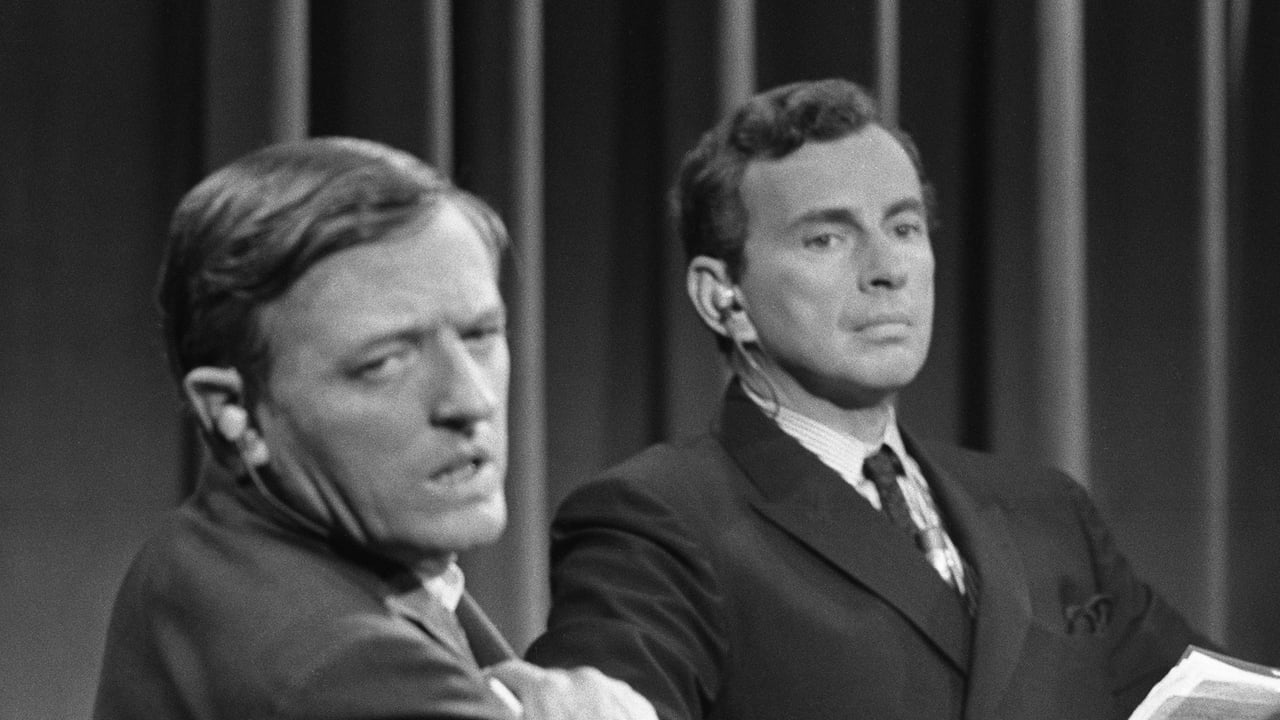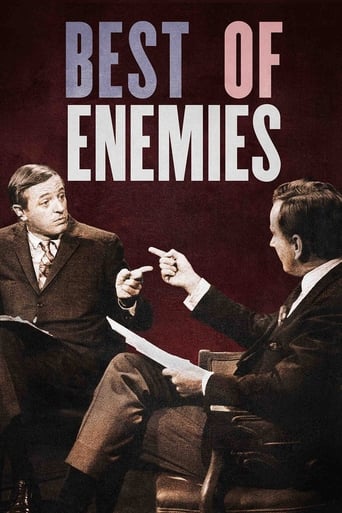

A fascinating and in depth look and the Buckley-Vidal debates and the precursors to the world we find ourselves in today. More interesting since I lived through this period and watched these debates in real time. We find ourselves in a world today not much different than the world of 1968 on race, economic inequality,far right and far left politics and down in the mud politics that doesn't debate issues but personal demagoguery. Buckley ran for mayor of NYC and discovered the angry white man as his main constituency, sound familiar Donald J. Trump.
... View MoreThis documentary put me in mind of Rumble in the Jungle, the documentary about the fight of the same name; like that one, Best of Enemies looks at a staged conflict which had an impact on popular culture. In this case it was a series of televised debates between Vidal and Buckley – two men on polar political extremes. It was interesting to watch this in the run up to the 2016 Presidential Debate between Trump and Clinton (at the time of writing this, the first one will be in 2 days' time) because it hearkens back to a time where the discourse was a little more civil. It is also interesting to note that there is still an edge to their communication, with Vidal using snide insults (as is the liberal way), and Buckley using more direct language in a jokey way (as is the conservative way).Not knowing anything about these debates, the film does a pretty good job of introducing the characters and their tensions, however it doesn't totally deliver in some key ways. Specifically it didn't bring out the period and the event as well as I would have liked; with Rumble in the Jungle you had a real sense of time/place, as well as the cultural importance of the event. With these debates that was not quite there; it didn't show enough of the debates to really explain why they were such an audience grabber. Likewise the film did not really link to its wider impact particularly well – a lot of this plays out under the credits, which felt weird considering that this was the moment of that shift.As an event, and with its large characters, it still is an interesting and engaging film, but it doesn't feel like it captures the event or its cultural impact in as compelling a way as it could have done.
... View MoreCo-directed by Robert Gordon and Morgan Neville, Best of Enemies chronicles the series of televised debates during the 1968 Republican and Democratic National Conventions, between conservative and liberal pundits, William F. Buckley and Gore Vidal.Television convention coverage was usually a staid affair, but Buckley and Vidal set the tone for years to come by going "mano a mano"— perhaps the first time commentators of such different political persuasions presented such stark differences of opinion in a remarkably entertaining fashion. Indeed, ABC, considered the "poor man's network" at the time (in contrast to powerhouses CBS and NBC), garnered such favorable ratings, that we're informed by Gordon and Neville that television was "never the same" after the broadcast of these imbroglios.Buckley, fairly well-known for his Firing Line show on PBS and Vidal, the noted author of various biographical novels of notable American politicians as well as other historical figures, both shared elite prep school backgrounds as well as being masters of the English language. One is struck however, by the true lack of substance as they grapple with the political issues of the day. Instead, each engages in a game of one-upmanship, trading cutting insults in order to humiliate one another. The debate finally takes an ugly turn when Vidal manages to push Buckley's buttons—calling him a crypto-Nazi and praising the protesters who waved the Vietcong flag and cursed the police outside the Democratic National Convention. Buckley, usually proud of his self-control, suddenly loses it and calls Vidal a "queer" and threatens to punch him in the face. While Vidal argues that the protesters had a perfect right to "free speech," Buckley regards their actions as the deepest betrayal to their country.The documentarians supplement the footage of the actual debate with newsroom out takes along with commentary from supporters and detractors of the two men including Christopher Hitchens, Dick Cavett and James Wolcott.Buckley is seen much later in life being interviewed, indicating that he was tired of life in general and "ready to die." While being interviewed by Ted Koppel, Buckley is stunned as he watches footage from the debates where he calls Vidal a "queer." After the footage is shown, he remarks to a friend that he thought that segment had been destroyed long ago. And Vidal appears equally obsessed with the debates, poring over them repeatedly at his Italian villa, much like an obsessed Norma Desmond watching her old silent pictures in "Sunset Boulevard."While Best of Enemies proves to be vastly entertaining, it's also a cautionary tale about two extremely gifted men who forgot to embrace humor to soften the vitriol between them. In that respect, their ultimate clash on television, should be seen much more in the context of tragedy than mere entertainment or what some others may label as a comic interlude.
... View MoreBest of Enemies (2015): Dir: Robert Gordon, Morgan Neville / Featuring: William F. Buckley, Gore Vidal, Dick Cavett, Noam Chomsky, Christopher Hitchens: Insightful and often humorous account of the 1968 debate between Conservative William F. Buckley and challenging Liberal Gore Vidal. Directors Robert Gordon and Morgan Neville use archive footage and spectating interviews to convey and story the event that was cut into ten separate debates that shot the ratings high. It also brought to light just how far issues could go around the censors when the debate got heated. William Buckley is only featured in archive footage but his opinionated demeanor is established quickly as he sees fit to put forth rights that he views that the public should have. Not everyone agrees with this method and he finds an opponent in Gore Vidal. He is amusing often hardly jolted by Buckley's stance on his lifestyle. Buckley aims quickly at films that Vidal has been involved with, particularly pointing out anything he deems crass or unacceptable. Gore often smirks and causes verbal outbursts in Buckley with his subtle yet comical retaliation. In the end we witness two lonely men whose lifestyles were highly public. Buckley is asked late in the film if he has any regrets in life and he prefers not to speak of it. Gore is more flamboyant, showing off pictures in his house, particularly one from the debates featuring he and Buckley. Spectators including Dick Cavett offer their food for thought but in the end this is an observant and often funny documentary on the dispute between two individuals of opposites ends of the spectrum. Score: 10 / 10
... View More